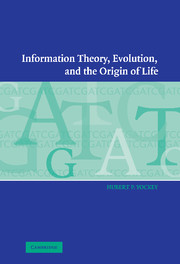Book contents
- Frontmatter
- Contents
- Preface
- 1 The genetic information system
- 2 James Watson, Francis Crick, George Gamow, and the genetic code
- 3 The Central Dogma of molecular biology
- 4 The measure of the information content in the genetic message
- 5 Communication of information from the genome to the proteome
- 6 The information content or complexity of protein families
- 7 Evolution of the genetic code and its modern characteristics
- 8 Haeckel's Urschleim and the role of the Central Dogma in the origin of life
- 9 Philosophical approaches to the origin of life
- 10 The error catastrophe and the hypercycles of Eigen and Schuster
- 11 Randomness, complexity, the unknowable, and the impossible
- 12 Does evolution need an intelligent designer?
- 13 Epilogue
- Mathematical appendix
- Glossary
- References
- Index
10 - The error catastrophe and the hypercycles of Eigen and Schuster
Published online by Cambridge University Press: 15 August 2009
- Frontmatter
- Contents
- Preface
- 1 The genetic information system
- 2 James Watson, Francis Crick, George Gamow, and the genetic code
- 3 The Central Dogma of molecular biology
- 4 The measure of the information content in the genetic message
- 5 Communication of information from the genome to the proteome
- 6 The information content or complexity of protein families
- 7 Evolution of the genetic code and its modern characteristics
- 8 Haeckel's Urschleim and the role of the Central Dogma in the origin of life
- 9 Philosophical approaches to the origin of life
- 10 The error catastrophe and the hypercycles of Eigen and Schuster
- 11 Randomness, complexity, the unknowable, and the impossible
- 12 Does evolution need an intelligent designer?
- 13 Epilogue
- Mathematical appendix
- Glossary
- References
- Index
Summary
A little learning is a dangerous thing;
Drink deep, or taste not the Pierian spring:
There shallow draughts largely intoxicate the brain,
And drinking largely sobers us again.
A little learning
Alexander Pope (1688–1744)Introduction
It often happens that two academic schools of thought, dealing with the same subject, totally ignore each other. “Can we use information theory to solve our problem of self-instruction?” (Eigen, 1971). Eigen and his colleagues use some theorems from information theory, but they have neglected the more important ones so that their work is not based on the axioms of information theory (Eigen, 1971, 1992, 2002). The most important ones they neglected are the Channel Capacity Theorem and the Shannon–McMillan–Breiman Theorem. The Göttingen School and Professor Dr. Manfred Eigen have made many important contributions to science. They are, however, not above comment.
Eigen's remedies for what he sees as inadequacy in Shannon's information theory and the Shannon–McMillan–Breiman Theorem
Shannon (1948), in his second paragraph, warned against confusing the semantic aspects of a message with the properties of the communication system that apply to any message. Eigen (1971) regards that as an inadequacy of classical information theory.
Eigen (1971) states that: “The information resulting from evolution is a valued information and the number of bits will not tell us too much about its functional significance.”… “If entropy characterizes the amount of “unknowledge,” then any decrease of “unknowledge” is equivalent to an increase of “knowledge” or “information.” The complementarity between information and entropy shows clearly the limited application classical information theory has to problems of evolution. […]
- Type
- Chapter
- Information
- Information Theory, Evolution, and the Origin of Life , pp. 158 - 163Publisher: Cambridge University PressPrint publication year: 2005



